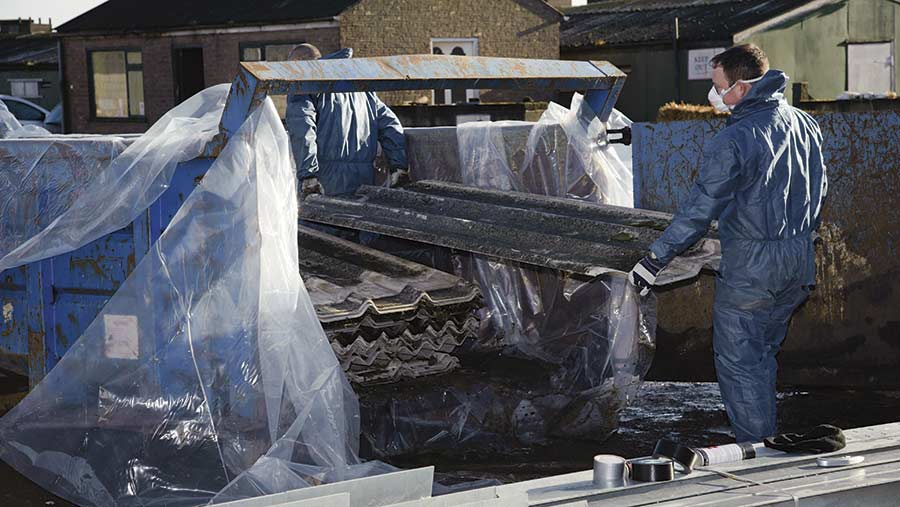Asbestos management advice: Know the rules
Farmers who fall foul of asbestos regulations could find themselves facing hefty fines.
A creamery in Northern Ireland was fined £30,000 in January 2016 because workers were exposed to asbestos.
The company pleaded guilty of failing to create an asbestos management plan and inform the workers of the hazardous material.
David Canty, farm consultant and health and safety expert at Strutt & Parker, said farmers should be aware of the Control of Asbestos Regulations, which came into effect in April 2012 and updated all earlier regulations.

© FLPA/Rex/Shutterstock
See also: Family of asbestos victim awarded £152,000
These rules require that businesses commit themselves to identifying and managing asbestos and asbestos-containing materials in the workplace.
The law also requires farmers to establish an asbestos management plan, which is monitored and reviewed, which makes it clear what the risks are and how they can be managed.
It also means keeping records up to date, carrying out risk assessments, ensuring that all employees are fully aware of asbestos and the risks of exposure to it.
Training should also be provided to all employees to prevent and minimise their exposure to asbestos dust.
Management plan
Mr Canty said a paid contractor can prepare an asbestos management plan with the costs ranging from £1,500 to £5,000 for a 480ha farm with a couple of cottages.
However, farmers can also establish their own plan, as long as they know where the asbestos is, what condition it is in and arrange to have it removed or inspected on annual basis.
Asbestos tips
- Know your asbestos. What type do you have, what condition is it in and where is it?
- Make sure tenants and workers are aware of the asbestos on your site and have been trained to minimise risk.
- Keep your asbestos plan up to date and if something needs checking annually, label it for inspection with check boxes.
- Never attempt to dispose of asbestos yourself, hire a licensed contractor if you find broken roof tiles or asbestos fly-tipped on your site,
- Unsure if a material on your farm is asbestos? Do not drill a hole in it to find out, potentially fatal fibres will be instantly created if asbestos is disturbed.
A fundamental question for farmers was identifying what sort of asbestos they had and that could only be determined by having it tested, he said.
Testing costs were typically upwards of £125, which included a site visit and singular sample test. Each sample after would cost around £25 or more, and that was before removal costs.
The Health and Safety Executive says if existing asbestos-containing materials are in good condition and are not likely to be damaged, they may be left in place and their condition monitored and managed to ensure they are not disturbed.
Mr Canty said materials containing asbestos only presented a hazard when asbestos fibres were released and dispersed so that they could be inhaled.
“Therefore, if you do have to move asbestos you must do carefully and wearing the appropriate Personal Protective Equipment (PPE). The best option is to leave it alone if you can or have it disposed of by a competent contractor.”
If the asbestos is damaged and broken then you need to get it removed if you intend to use the structure or area.
But always use a licensed contractor to work with and dispose of asbestos-containing materials and suspected asbestos-containing materials.
The legislation also covers any residential housing on your farm in order to protect yourself, your tenants and any workers, added Mr Canty.
“If you’re having work done, you must notify contractors that there could be asbestos in that area.
“The management plan will identify exactly where any asbestos is which can then be used to advise contractors and also allow the asbestos to be monitored properly.”
Costs of disposing of asbestos
The cost of disposing of asbestos is based on the weight and type of asbestos material.
“If you have 20 x 20kg bags of asbestos cement you would probably pay around £600 for removal,” said Lewis Dunkley, operations manager of Green Shield Environment, based near Stevenage. The most expensive job he had seen on a farm recently was £12,000 for the removal of an asbestos roof.
If a roof was in a good, solid condition then it could be left alone, but employees or tenants must be informed and aware of its location, said Mr Dunkley. “It gets very expensive when you are removing thermal insulation, that can cost up to £28,000,” he said. “But that includes bagging and removal.”
